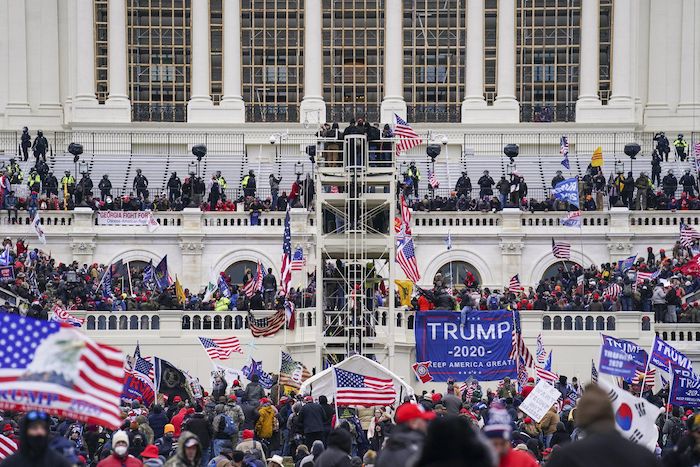DEI
University System of Georgia to ban DEI, commit to neutrality, teach Constitution
By
“The basis and determining factor” for employment will be “that the individual possesses the requisite knowledge, skills, and abilities associated with the role, and is believed to have the ability to successfully perform the essential functions, responsibilities, and duties associated with the position for which the individual is being considered.”
The University System of Georgia’s Board of Regents has recommended a number of new and revised policies for its institutions, such as a commitment to institutional neutrality, the prohibiting of DEI tactics, and a mandatory education in America’s founding documents.
The University System of Georgia (USG) is made up of Georgia’s 26 public colleges and universities as well as Georgia Archives and the Georgia Public Library Service.
“USG institutions shall remain neutral on social and political issues unless such an issue is directly related to the institution’s core mission,” the board’s proposed revisions read.
“Ideological tests, affirmations, and oaths, including diversity statements,” will be banned from admissions processes and decisions, employment processes and decisions, and institution orientation and training for both students and employees.
“No applicant for admission shall be asked to or required to affirmatively ascribe to or opine about political beliefs, affiliations, ideals, or principles, as a condition for admission,” the new policy states.
Additionally, USG will hire based on a person’s qualifications and ability.
“The basis and determining factor” for employment will be “that the individual possesses the requisite knowledge, skills, and abilities associated with the role, and is believed to have the ability to successfully perform the essential functions, responsibilities, and duties associated with the position for which the individual is being considered.”
Beginning in the 2025-2026 academic year, the school’s civic instruction will require students to study founding American documents among other things.
USG students will learn from the Declaration of Independence, the United States Constitution and Bill of Rights, the Articles of Confederation, the Federalist Papers, the Gettysburg Address, the Emancipation Proclamation, and Martin Luther King Jr.’s Letter from Birmingham Jail, as well as the Georgia Constitution and Bill of Rights.
When reached for comment, the Board of Regents told The Center Square that “these proposed updates strengthen USG’s academic communities.”
The recommended policies allow a campus environment “where people have the freedom to share their thoughts and learn from one another through objective scholarship and inquiry,” and “reflect an unyielding obligation to protect freedom, provide quality higher education and promote student success,” the board said.
The board told The Center Square that it proposed strengthening “the requirements for civics instruction” with the inclusion of “foundational primary sources” because of higher education’s duty to students.
Colleges and universities “must prepare [students] to be contributing members of society and to understand the ideals of freedom and democracy that make America so exceptional,” the board said.
As for ditching DEI, the board explained that “equal opportunity and decisions based on merit are fundamental values of USG.”
“The proposed revisions among other things would make clear that student admissions and employee hiring should be based on a person’s qualifications, not his or her beliefs,” the board said.
The Board of Regents also said it wants to “ensure [its] institutions remain neutral on social and political issues while modeling what it looks like to promote viewpoint diversity, create campus cultures where students and faculty engage in civil discourse, and the open exchange of ideas is the norm.”
USG’s Board of Regents recently urged the NCAA to ban transgender-identifying men from participating in women’s sports, in line with the NAIA rules, The Center Square previously reported.
Business
Canadian gov’t spending on DEI programs exceeds $1 billion since 2016

From LifeSiteNews
Some departments failed to provide clear descriptions of how the taxpayer funds were used. For example, Prairies Economic Development Canada spent $190.1 million on projects related to diversity, equity and inclusion ventures but could not provide details.
Federal diversity, equity and inclusion programs have cost Canadian taxpayers more than $1 billion since 2016.
According to information published September 18 by Blacklock’s Reporter, diversity, equity and inclusion (DEI) government grants have totaled $1.049 billion since 2016, including grants for “cultural vegetables.”
A $25 million grant, one of the largest individual grants, was given to the Canadian Gay and Lesbian Chamber of Commerce to “strengthen Canada’s entrepreneurship ecosystem to be more accessible to LGBTQ small businesses.”
The government payouts were distributed among 29 departments, ranging from military to agricultural projects.
The Department of Agriculture spent $90,649 for “harvesting, processing and storage of cultural vegetables to strengthen food security in equity-deserving Black communities” in Ontario.
Some departments failed to provide clear descriptions of how the taxpayer funds were used. For example, Prairies Economic Development Canada spent $190.1 million on projects related to diversity, equity and inclusion ventures but could not provide details.
“PrairiesCan conducted a search in our grants and contributions management system using the keywords ‘equity,’ ‘diversity’ and ‘inclusion,’” the Inquiry said. “Certain projects were included where diversity, equity and inclusion were referenced but may not be the main focus of the project.”
DEI projects are presented as efforts by organizations to promote fair treatment, representation, and access to opportunities for people from varied backgrounds. However, the projects are often little more than LGBT propaganda campaigns funded by the Liberal government.
As LifeSiteNews reported, the University of British Columbia Vancouver campus posted an opening for a research chair position that essentially barred non-homosexual white men from applying for the job.
Additionally, during his short time in office, Liberal Prime Minister Mark Carney has already shown Canadians that he is a staunch supporter of the LGBT agenda after he spent over $2 million in taxpayer funding on LGBT groups during his first week in office.
Canadians have repeatedly appealed to Liberals to end pro-LGBT DEI mandates, particularly within the education system.
As LifeSiteNews previously reported, in June 2024, 40 Canadian university professors appealed to the Liberal government to abandon DEI initiatives in universities, arguing they are both ineffective and harmful to Canadians.
Business
Cracker Barrel and the Power of Conservative Boycotts

The uproar over the restaurant chain’s rebrand might appear trivial, but it carries a deeper significance.
Last week, another viral culture war story captured the headlines. The old-timey restaurant chain Cracker Barrel had rebranded, removing the old man and the barrel from its logo, and replacing it with a simple, modernistic, typography-only design.
At first, I dismissed the story as trivial. I have never set foot in a Cracker Barrel and, as such, have little stake in what is emblazoned above its doorways. But after speaking with conservative activist Robby Starbuck, I learned there was something beyond the logo that deserved our attention. According to Starbuck, Cracker Barrel, whose customer base is heavily white, conservative, and rural, had spent the last few years adopting all the fashionable left-wing corporate policies: DEI, Pride, pronouns, race politics, and the rest.
The logo change might have caught the public’s initial attention, but the underlying political story had real stakes. If companies that depend on conservatives adopt radical left-wing policies, they must face the consequences.
And, thanks to the work of Starbuck and others, the social media uproar seems to have made a difference. As the story circulated through the media, the company’s stock price plummeted by as much as 17 percent. Cracker Barrel has quickly walked back its changes.
All this is salutary. Beginning with the revolt against Bud Light, the Right learned how to flex its muscles in the marketplace. Rather than defer to corporations as they did in the past, conservatives have realized that corporations have a culture and must be constantly reminded that, if they deviate from core American values, the consequences will be felt in their bottom line. Starbuck has had enormous success on this point, leading boycott campaigns that have changed policies at Harley-Davidson, Tractor Supply, John Deere, and other major brands.
A number of lessons can be drawn from this experience. First, conservatives can win these culture fights. Second, corporations follow the narrative in the media. Third, behavior changes through reward and punishment.
This last point is especially important. Some might dismiss the Cracker Barrel campaign as minor, or even embarrassing, given that the company is a decidedly down-class brand. But there is enormous value in making an example of the company and cementing a fear that conservatives can spontaneously lash out at any institution that crosses the line. Today, it’s Cracker Barrel; tomorrow it might be Pepsi, Target, or Procter & Gamble. As we have seen in recent years, corporate CEOs are highly sensitive to shifts in public opinion—and marginal changes in revenues—and will drop left-wing policies as soon as they become a liability.
The question is how to gain leverage. We are all tempted to be polite in public. But the fight over corporate culture can’t be won without securing real, tangible victories—which means real, tangible losses for institutions on the other side. Even if we don’t care about Cracker Barrel in particular, we should all care about the ideological capture of American institutions and use whatever power we have to reverse it.
And for that to occur, the Barrel must be broken.
Subscribe to Christopher F. Rufo.
For the full experience, upgrade your subscription.
-

 Business2 days ago
Business2 days agoCanada Is Still Paying The Price For Trudeau’s Fiscal Delusions
-

 International1 day ago
International1 day agoTrump says he won’t back down on Antifa terrorism designation
-

 COVID-192 days ago
COVID-192 days agoSecond Massive Population Study Finds COVID-19 “Vaccines” Increase Risk of 6 Major Cancers
-

 Censorship Industrial Complex1 day ago
Censorship Industrial Complex1 day agoTotal Surveillance, Censorship, And Behavior Control Are Real Goals Of Digital ID Advocates
-

 Business1 day ago
Business1 day agoDepartment of Energy returning $13B climate agenda funding to taxpayers
-

 armed forces1 day ago
armed forces1 day agoUnderfunded and undermanned, Canada’s Reserves are facing a crisis
-

 Daily Caller2 days ago
Daily Caller2 days agoShale Execs Complain Of ‘Broken’ Prospects In New Survey
-

 International14 hours ago
International14 hours agoWhat was the FBI up to on January 6?







